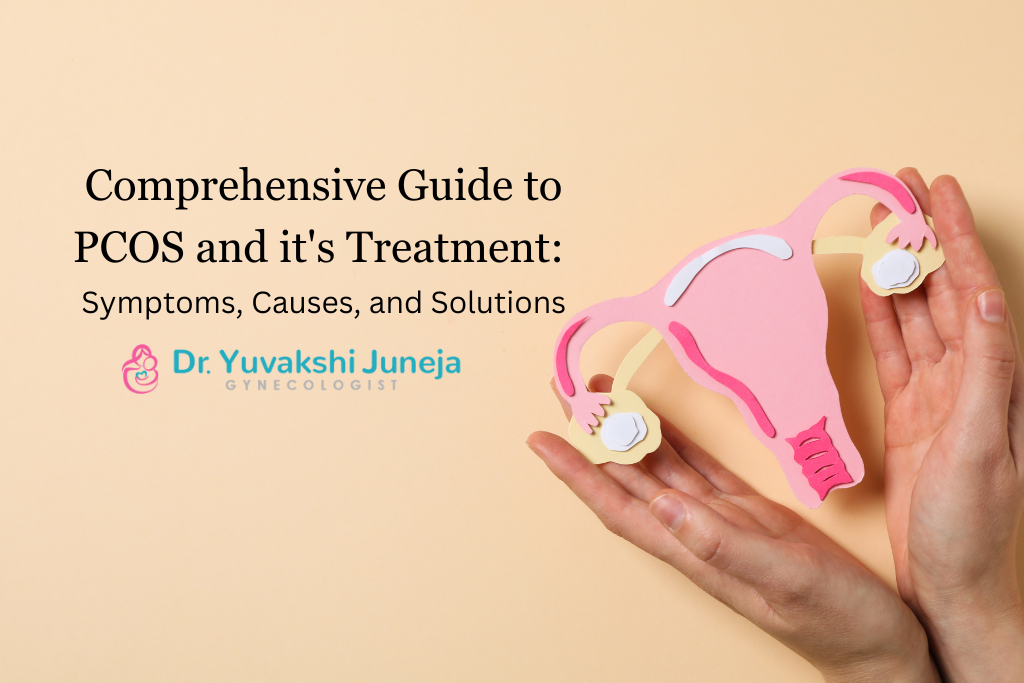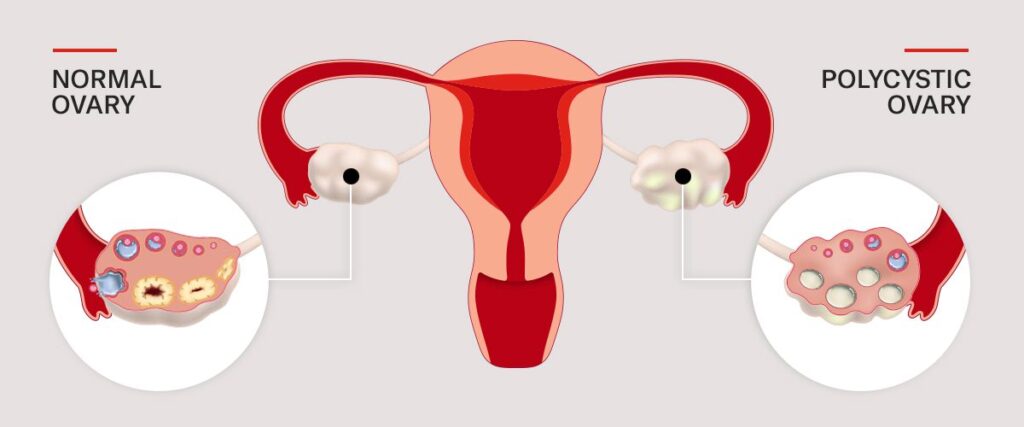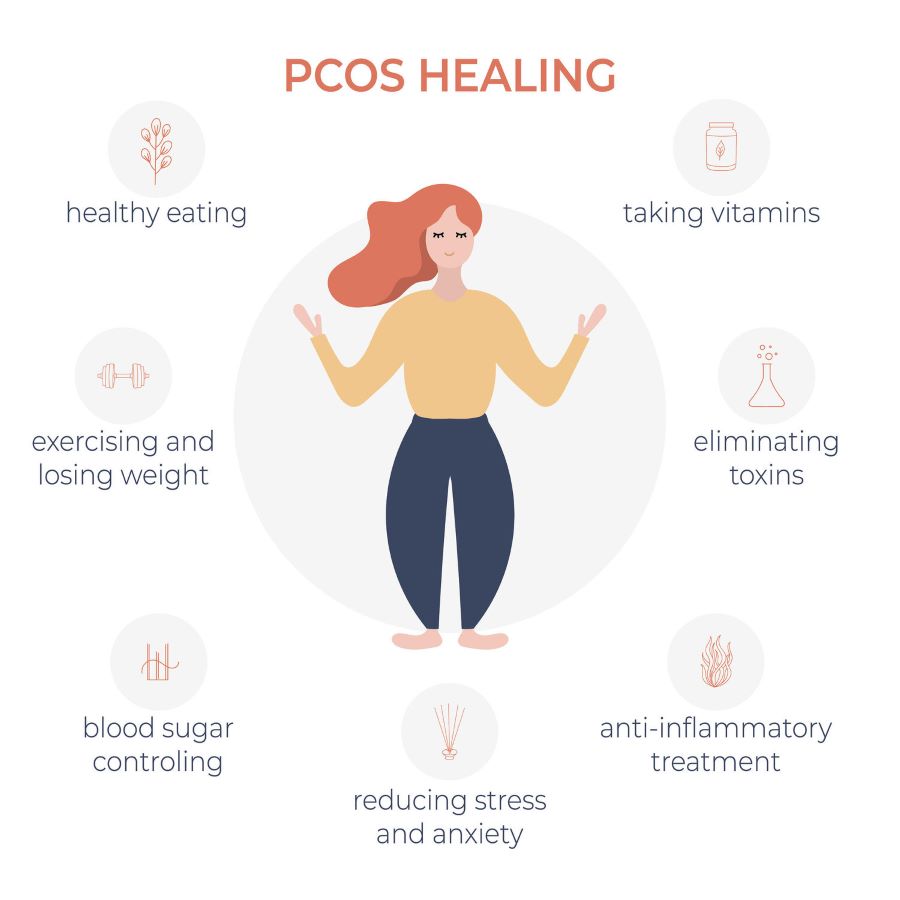Comprehensive Guide to PCOS: Causes, Symptoms, and Treatments for a Healthier Life

In today’s time, the major problem faced by many women is Polycystic Ovary Syndrome (PCOS). Research shows that out of every ten women, 1 or 2 are affected by PCOS. It even affects approximately 10% of women’s reproductive age and is one of the leading causes of infertility. It is a hormonal disorder that not only impacts reproductive health but also manifests various symptoms affecting overall health. Common PCOS symptoms include sudden weight gain, irregular periods, acne, excessive hair growth, etc. and It is important to get PCOS treatment at the earliest for effective management and improved well-being.
In this blog, we will explore the complex nature of PCOS, which will provide you with a wealth of information related to its causes, symptoms, and potential complications. So, whether you have been recently diagnosed with PCOS or have been living with it for years, this guide aims to equip you with the right knowledge and understanding that will help you manage your condition effectively. We will also discuss the various treatment options that will help alleviate the symptoms and improve your overall quality of life.
What is Polycystic Ovary Syndrome (PCOS)?

Polycystic Ovary Syndrome (PCOS), also known as Stein-Leventhal Syndrome, is a hormonal disorder that affects women’s hormones and causes the ovaries to enlarge and develop small cysts. This hormonal disease is characterized by the presence of multiple cysts on the ovaries, an irregular menstrual cycle, and high levels of androgens (male hormones) in the body. If left untreated, PCOS can also lead to long-term health issues such as heart disease, type 2 diabetes, and infertility.
Although treating PCOS can be challenging, it can be treated properly under the guidance of one of the best gynecologist clinics in Delhi. However, the patient needs to understand the underlying causes of the disorder. It will help them develop a personalized treatment plan that meets their needs.
PCOS Infertility: Causes
Well, underlying the exact cause of Polycystic ovaries diagnosis can’t be possible. It basically depends on the individuals and their circumstances. However, with our vast years of experience in helping patients recover from PCOS, we can help you understand the most common and possible causes of PCOS infertility.
- Genetic Factors: A woman’s risk of developing PCOS rises when she has family members with the disorder. PCOS risk gets higher even if one’s mother or siblings suffer from type 2 diabetes.
- Hormonal Imbalances: Hormonal imbalances, especially high levels of insulin and androgens, play a significant role in the development of PCOS. Imbalances in these hormones affect the normal functioning of the ovaries.
- Lifestyle Factors: Women’s lifestyle factors, such as a high level of stress, a poor diet, and a lack of exercise, also contribute to the development of PCOS disorder. These factors tend to worsen the disorder’s symptoms by disturbing the hormonal balance even more.
- Obesity: Obesity is another factor that gives rise to the development of PCOS. Being overweight enhances the risk of insulin resistance, which alters hormone levels and speeds up the beginning of PCOS. Furthermore, obesity may worsen polycystic ovary syndrome symptoms, thereby making it more difficult to properly handle the hormonal disorder.
Complications of PCOS
If PCOS is not treated on time, it can lead to various complications in the woman’s health. Some of the most common complications are highlighted below:
- Infertility: Infertility is a major concern for women dealing with PCOS. The increased production of androgens in PCOS can hinder the process of egg formation, making it more challenging for women with PCOS and fertility concerns to conceive
- Endometrial Cancer: Irregular menstrual cycles and unrepaired exposure to estrogen can increase the risk of endometrial cancer in women with PCOS.
- Cardiovascular Complications: Women with PCOS are at a higher risk of developing cardiovascular complications such as high blood pressure, stroke, heart disease, etc. This risk can even go higher if the woman is suffering from obesity and insulin resistance, which are frequently linked with PCOS.
- Metabolic Issues: Long-term PCOS leads to metabolic issues such as insulin resistance and obesity, which further result in high blood sugar and increase the chances of developing type 2 diabetes and other metabolic issues.
Lifestyle Changes for PCOS Management
PCOS self-care requires women to make healthy lifestyle changes. From eating the right food to getting adequate sleep and maintaining a healthy lifestyle, there are various strategies that a woman should adopt in her life to manage PCOS effectively.
As soon as you start working on these lifestyle changes, the more quickly you will be able to see the benefits for your health.
- Balanced Nutrition: Adopt a well-balanced diet that includes a variety of nutrition-rich foods such as vegetables, fruits, lean proteins, and healthy fats. Avoid eating processed and sugary foods. This will maintain a healthy weight and regulate insulin levels.
- Regular Physical Activity: Regular physical activity is a must for women suffering from PCOS. Start your fitness journey with a 10-minute walk and increase it gradually. This will regulate the menstrual cycle and help in the fast recovery of PCOS.
- Hydration: Don’t let your body get dehydrated. Drink plenty of water throughout the day. This will flush out the harmful toxins from your body and improve digestion. It is recommended to drink at least 8 glasses of water daily to maintain proper hydration levels.
- Adequate Sleep: Sleep is essential for general health and wellbeing, especially for women with PCOS. Strive for 7-8 hours of quality sleep every night to aid with stress management and hormone control. The quality of your sleep can also be increased by following suitable sleep hygiene procedures, which involve creating an enjoyable sleeping environment and having a regular nighttime pattern.
- Stress Management Techniques: Start doing stress management techniques such as meditation, yoga, or deep breathing exercises. This will help in reducing stress levels, which will further improve hormone balance and overall well-being.
Diet Chart for PCOS Treatment

Diet plays a key role in PCOS treatment. It helps regulate hormone levels and manage weight. Although understanding the diet chart means you should be aware of the foods that you must eat and the foods that you have to avoid at all costs.
A) Best Food to Consume for PCOS Treatment:
- Leafy greens and vegetables
- Avocado
- Fatty Fish
- Greek Yogurt
- Whole grains and lean proteins
- Berries
- Turmeric
To get the maximum benefit out of your PCOS treatment, it is highly suggested that you incorporate these foods into your diet on a regular basis. Don’t forget to add plenty of water to your diet along with those foods.
B) Foods to Avoid During PCOS
During the PCOS disorder, there are certain foods that you should avoid eating at any cost. These are highlighted below:
- Processed and ready-to-eat foods
- Sugary Beverages
- Red Meat
- Alcohol
- Trans Fat
- White Rice
- Excessive Caffeine
- High-Sodium Foods
- Artificial Sweeteners
PCOS Treatment
Treating Polycystic Ovary Syndrome (PCOS) requires a multifaceted approach with the aim of managing symptoms, correcting hormonal imbalances, and enhancing overall well-being. Implementing the right lifestyle strategies and consulting one of the best gynecologist doctors in Chirag Enclave, Delhi, will help in developing a personalized treatment plan that fits perfectly for your body condition.
Additionally, taking the prescribed medications and following the doctor’s recommendations are crucial for effectively treating PCOS. Proactive therapy approaches and early diagnosis will help women with PCOS take care of their disease effectively under the supervision of medical professionals such as Dr. Yuvakshi Juneja-renowned as best gynecologist in delhi .
Conclusion
Polycystic Ovary Syndrome (PCOS) is a preventable hormonal disease that affects a significant number of women across the globe. This comprehensive guide has highlighted the complex nature of PCOS, its causes and symptoms, and how you can treat it. Recognizing the need for early diagnosis and tailored treatment under the doctor’s guidance will help you manage and control your PCOS symptoms effectively. Dr. Yuvakshi Juneja is a renowned and best gynecologist doctor in Delhi who specializes in PCOS treatment. With the right approach and support from her, women suffering from PCOS can start fulfilling their lives and minimizing the impact of the disorder on their overall well-being.
Frequently Asked Questions
1. Can Someone with PCOS drink milk?
Ans. Yes, opt for low-fat or skim milk and monitor your body’s response, as some individuals with PCOS may be sensitive to dairy.
2. Can a PCOS patient get pregnant?
Ans. Yes, with proper medical guidance of a gynecologist and sometimes fertility treatments, many women with PCOS can conceive successfully.
3. What is the difference between PCOD and PCOS?
PCOS involves hormonal imbalance, cysts on ovaries, irregular cycles, and higher androgen levels, while PCOD refers to ovaries with multiple immature eggs and similar symptoms but less severe hormonal disruption.

